Pippin
Musical (1972)
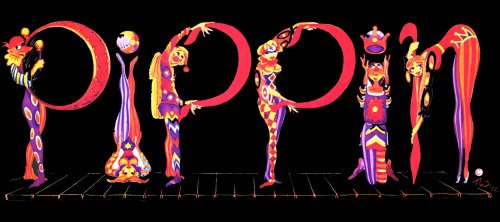
The man 'born to be King' or rather Emperor, has a problem - boredom. Pippin, eldest son of Charlemagne, tired of books, war, love and politics, in his quest for happiness finally finds fulfilment only in peaceful domesticity. This brilliant score is set in the dazzling court of the 8th Century Holy Roman Emperor.
Once upon a time, the young prince Pippin longed to discover the secret of true happiness and fulfilment. He sought it in the glories of the battlefield, the temptations of the flesh and the intrigues of political power (after disposing of his father King Charlemagne the Great). In the end, he found it in the simple pleasures of home and family.
Afficher le synopsis détaillé
The play begins with a Leading Player of a troupe and the accompanying actors in various costume pieces of several different time periods, establishing the play's intentionally anachronistic, defamiliarized, unconventional feel. Channeling the style of Bertolt Brecht, Hirson breaks the fourth wall, and the Leading Player and his troupe speak directly to the audience. They invite members of the crowd to join them in a story about a boy prince searching for fulfillment ("Magic to Do"). They reveal that the boy who is to play the title character is a new actor. Pippin tells the scholars of his dreams to find where he belongs ("Corner of the Sky"), and they happily applaud Pippin on his ambitious quest for an extraordinary life. Pippin then returns home to the castle and estate of Charlemagne (King Charles), his father. Charles and Pippin don't get a chance to communicate often, as they are interrupted by nobles, soldiers, and courtiers vying for Charles' attention ("Welcome Home"), and Charles is clearly uncomfortable speaking with his educated son or expressing any loving emotions. Pippin also meets up with his stepmother Fastrada, and her dim-witted son Lewis. Charles and Lewis are planning on going into battle against the Visigoths soon, and Pippin begs Charles to take him along so as to prove himself. Charles reluctantly agrees and proceeds to explain a battle plan to his men ("War is a Science").
Once in battle, the Leading Player re-enters to lead the troupe in a mock battle using top hats, canes, and fancy jazz as to glorify warfare and violence ("Glory"). Fosse's famous "Manson Trio" is performed by the Leading Player and his two lead dancers in the middle of this number. This charade of war does not appeal to Pippin, and the boy flees into the countryside. The Leading Player tells the audience of Pippin's travel through the country, until he stops at his exiled grandmother's estate ("Simple Joys"). There, Berthe (his grandmother, and Charles's mother, exiled by Fastrada) tells Pippin not to be so serious and to live a little ("No Time At All"). She sings, "Oh, it's time to start livin'. Time to take a little from this world we're given. Time to take time, cause spring will turn to fall in just no time at all." Pippin takes this advice and decides to search for something a bit more lighthearted ("With You"). While he initially enjoys these meaningless sexual encounters, he soon discovers that relationships without love leave you "empty and unfulfilled."
The Leading Player then tells Pippin that perhaps he should fight tyranny, and uses Charles as a perfect example of an unenlightened tyrant to fight. Pippin plans a revolution, and Fastrada is delighted to hear that perhaps Charles and Pippin will both perish so that her beloved Lewis can become king. Fastrada arranges the murder of Charles, and Pippin falls victim to her plot ("Spread a Little Sunshine"). While Charles is praying at Arles, Pippin murders him, and becomes the new king ("Morning Glow"). However, after petitions from the masses, Pippin realizes that neither he nor his father could change society and had to act as tyrants. He begs the Leading Player to bring his slain father back to life, and the Leading Player does so. At this point in the currently licensed production, the Leading Player then introduces Pippin to The Finale.
Pippin is left without direction until the Leading Player inspires him ("On the Right Track"). After experimenting with art and religion, he falls into monumental despair and collapses on the floor. Catherine finds him on the street, and is attracted by the arch of his foot ("And There He Was") and when Pippin comes to, she introduces herself to Pippin ("Kind of Woman"), a widow, with a small boy, Theo. From the start, it is clear that the Leading Player is concerned with Catherine's actual attraction to Pippin—after all, she is but a player playing a part in his yet-to-be-unfolded plan. At first, Pippin thinks himself above such boring manorial duties as sweeping, repairs, and milking cows ("Extraordinary"), but eventually he comforts Theo on the sickness and eventual death of his pet ("Prayer for a Duck") and warms up to the lovely Catherine ("Love Song"). However, as time goes by, Pippin feels that he must leave the estate to continue searching for his purpose. Catherine is heartbroken, and reflects on him (much to the Leading Player's anger and surprise) ("I Guess I'll Miss the Man").
All alone on a stage, Pippin is surrounded by the Leading Player and the various troupe members. They all suggest that Pippin complete the most perfect act ever: the Finale. They tell Pippin to jump into a box of fire, light himself up, and "become one with the flame." Pippin is reluctant at first, but slowly loses resistance ("Finale"). He is stopped by his natural misgivings and also by one actress from the troupe—the woman playing Catherine. Catherine and her son Theo stand by Pippin and defy the script, the Leading Player, and Fastrada. Pippin comes to the realization that the widow's home was the only place where he was truly happy ("Magic Shows and Miracles") "...I never came close my love". Having experimented with every possible path to fulfillment, he feels humbled, and realizes that maybe the most fulfilling road of all is a modest, ordinary life. He comes to the conclusion that, while "settling down" may at times be mundane and boring, "if [he's] never tied to anything, [he'll] never be free." After removing the sets, lighting, makeup, and costumes from the stage (to no success at dissuading Pippin), The Leading Player becomes furious and calls off the show, telling the rest of the troupe and the orchestra to pack up and leave Pippin, Catherine, and her son alone on an empty, dark and silent stage: "You try singing without music, sweetheart!" Pippin realizes that he has given up his extraordinary purpose for the simplest and most ordinary life of all, and he is finally a happy man. Well, perhaps. When Catherine asks him if he feels like a compromiser or a coward, he says no. But he does feel "trapped," and that, so he says, "isn't too bad for the end of a musical comedy."
Alternate ending
The currently licensed edition of Pippin has a slightly different ending. After the troupe throws their gloves at Pippin, and he avers his contentment with a simple life with Catherine, Theo remains on stage, picks up a glove and sings a verse of "Corner of the Sky", after which the Leading Player and the troupe return onto the stage. The Leading Player reaches a hand out to Theo. Pippin and Catherine return, watching in fear, unable to do anything. The light on Theo becomes brighter, and presumably, the cycle continues. Blackout. Current productions vary between the two possible endings, though Schwartz himself has expressed his preference for the newer ending.
The musical uses the premise of a mysterious performance troupe, led by a Leading Player, to tell the story of Pippin, a young prince on his search for meaning and significance. The protagonist, Pippin, and his father, Charlemagne, derive their characters from two real-life individuals of the early Middle Ages, though the plot presents very little historical accuracy regarding either. The show was partially financed by Motown Records.
Though Pippin is written to be performed in one act and its single-arc structure does not easily accommodate an intermission, many performances are broken into two acts. In the two-act version currently licensed by Musical Theatre International, the intermission comes after "Morning Glow", with an Act I finale – an abridged version of "Magic to Do" – inserted after Charles's resurrection. As with the new ending, the intermission can be added at the director's discretion without additional permission required.
Magic to Do* – Leading Player and Ensemble
Corner of the Sky† – Pippin
Welcome Home – Charlemagne
War Is a Science – Charlemagne
Glory – Leading Player and Ensemble
Simple Joys – Leading Player
No Time at All‡ – Berthe
With You – Pippin
Spread a Little Sunshine – Fastrada
Morning Glow** – Pippin and Ensemble
On the Right Track – Leading Player and Pippin
And There He Was – Catherine
Kind of Woman – Catherine
Extraordinary – Pippin
Prayer for a Duck – Pippin
Love Song – Pippin and Catherine
I Guess I'll Miss the Man†† – Catherine
Finale/Magic Shows and Miracles – Leading Player, Fastrada, Pippin and Ensemble
* Introduced by Ben Vereen in the Broadway production and performed by Northern J. Calloway in London.
†Introduced by John Rubinstein in the title role on Broadway and performed by Paul Jones in the London production. The song was covered by The Jackson 5 in 1972, and is included as a bonus track on the 2000 CD release of the Original Broadway Cast Recording. A duet by Dusty Springfield and Petula Clark, whose vocals were recorded more than thirty years apart, is included on Clark's 2007 CD Duets.
‡Introduced by Irene Ryan in the Broadway production and performed by Elisabeth Welch in London.
** The song was covered by Michael Jackson (from his 1973 album Music and Me), and is included as a bonus track on the 2000 CD release of the Original Broadway Cast Recording.
††The song was covered by The Supremes in 1972, and is included as a bonus track on the 2000 CD release of the Original Broadway Cast Recording.
In the original 1972 production Fosse planned to use Stephen Schwartz's song "Marking Time" but before the show opened on Broadway the song was replaced with "Extraordinary".
Aucun dossier informatif complémentaire concernant Pippin
Aucun dossier informatif complémentaire concernant Pippin
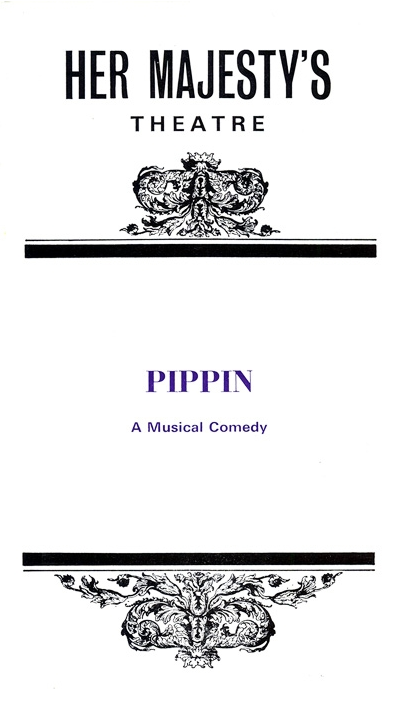
Version 1
Pippin (1973-10-Her Majesty's Theatre-London)
Type de série: Original LondonThéâtre: Her Majesty's Theatre (Londres - Angleterre)
Durée : Nombre : 85 représentationsPremière Preview : 30 October 1973
Première: 30 October 1973
Dernière: InconnuMise en scène : Bob Fosse • Chorégraphie : Bob Fosse • Producteur : Star(s) : Avec: Norman J. Calloway (Leading Player) , Paul Jones (Pippin) , John Turner (Charlelemagne ), Bobby Bannerman (Lewis), Diane Langton (Fastrada), Elisabeth Welch (Berthe)Commentaires : This was an anti-war story in a commedia-dell-arte style, reminiscent of the “flower power” philosophy of the recent past, and was a great success on Broadway, running for 1.944 performances. The London production was an expensive flop.
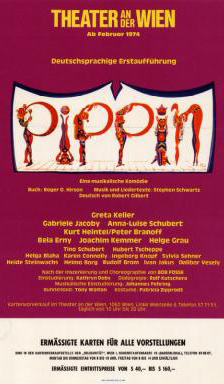
Version 2
Pippin (1974-02-Theater an der Wien-Vienne)
Type de série: RevivalThéâtre: Theater an der Wien (Vienne - Autriche) Durée : Nombre : 75 représentationsPremière Preview : 10 February 1974
Première: 10 February 1974
Dernière: InconnuMise en scène : Bob Fosse • Chorégraphie : Bob Fosse • Rolf Kutschera • Producteur : Star(s) :
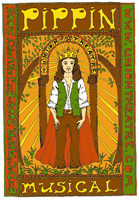
Version 3
Pippin (2004-12-Union Theatre-London)
Type de série: RevivalThéâtre: Union Theatre (Londres - Angleterre) Durée : 1 mois Nombre : Première Preview : 09 December 2004
Première: 09 December 2004
Dernière: 08 January 2005Mise en scène : Ben De Winter • Sasha Regan • Chorégraphie : Producteur : Star(s) : Avec: Andrew Whitlaw (Leading Player), Daniel Lane (Pippin), Adam Booth (Charlemagne), Jasper Hone (Lewis), Sioned Jones (Fastrada), Susan Travers (Berthe), Charlotte Marisa Moore (Catherine), Bryony Hannah (Theo)Commentaires : This was a slightly tongue-in-cheek revival of the show, framing it as a show within a show, for example, using the device of a glove puppet for the scene where Theo’s duck dies, and slightly sending up the over-sentimental parts of the show.
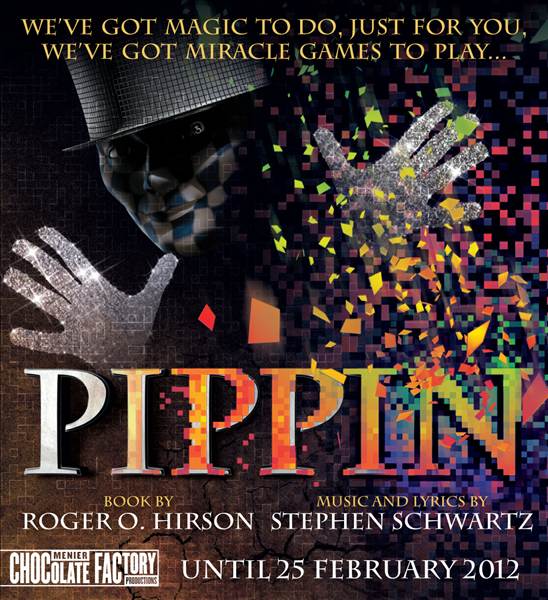
Version 4
Pippin (2011-12-Menier Chocolate Factory-London)
Type de série: RevivalThéâtre: Menier Chocolate Factory (Londres - Angleterre) Durée : 2 mois 2 semaines Nombre : 15 previews - 80 représentationsPremière Preview : 22 November 2011
Première: 07 December 2011
Dernière: 25 February 2012Mise en scène : Chorégraphie : Bob Fosse • Producteur : Star(s) : Avec: Matt Rawle (Leading Player) , Harry Hepple (Pippin) , Ian Kelsey (Charlemagne ), David McMullan (Lewis), Louise Gold (Berthe), Frances Ruffelle (Fastrada), Stuart Neal (Theo), Carly Bawden (Catherine), Ben Bunce, Bob Harms, Holly James, Anabel Kutay, Kate TydmanCommentaires : This was a love-it-or-hate-it revival. It was completely re-thought as a present-day video game, played by a present-day Pippin, with the Leading Player “guiding” him through the various “levels”: family, violence, orgiastic sex, religious quest, ordinary life and a grim suicidal interlude. Set in an adolescent boy’s bedroom, it is filled with elaborate projections, light displays, neon laser beams and hi-tech visual trickery. It was also very, very loud! After the first month the role of Berthe was played by a series of performers, Caroline Quentin, Gay Soper, Josie Lawrence and then back to Louise Gold for the last two weeks. It previewed from November 22 nd, and collected strongly polarised notices: “Up Allegory Creek without a paddle. . . excruciatingly fey” (Times), “staggeringly incoherent” (Financial Times), “ a bold, radical revival with a certain dizzying appeal” (Time Out)
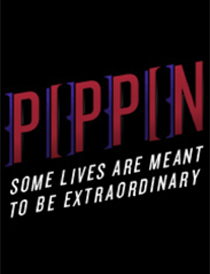
Version 5
Pippin (2013-04-Music Box Theatre-Broadway)
Type de série: RevivalThéâtre: Music Box Theatre (Broadway - Etats-Unis) Durée : 1 an 8 mois 2 semaines Nombre : Première Preview : 23 March 2013
Première: 25 April 2013
Dernière: 04 January 2015Mise en scène : Diane Paulus • Chorégraphie : Chet Walker • Producteur : Star(s) : Avec: Matthew James Thomas (Pippin), Patina Miller (Leading Player), Terrence Mann (Charles), Charlotte d’Amboise (Fastrada), Rachel Bay Jones (Catherine), Andrea Martin (Berthe), Erik Altemus (Lewis), Gregory Arsenal, Andrew Cekala, Lolita Costet, Colin Cunliffe, Andrew Fitch, Orion Griffiths, Viktoria Grimmy, Olga Karmansky, Bethany Moore, Brad Musgrove, Stephanie Pope, Philip Rosenberg, Yannick Thomas, Molly Tynes and Anthony Wayne.
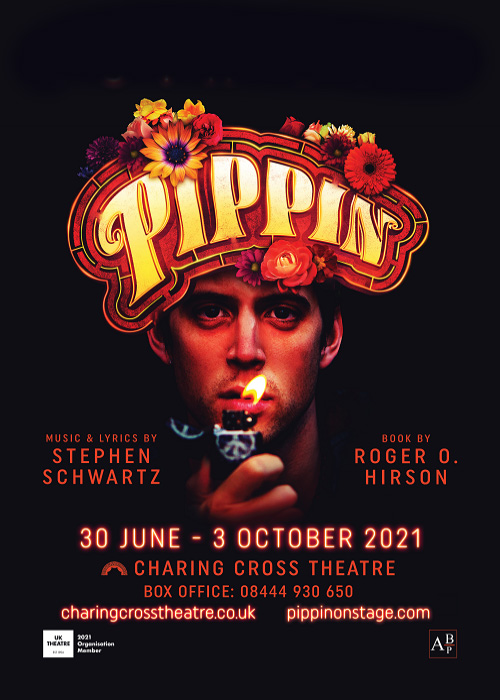
Version 6
Pippin (2021-06-Charing Cross Theatre-London)
Type de série: RevivalThéâtre: Charing Cross Theatre (Londres - Angleterre) Durée : 3 mois Nombre : Première Preview : 30 June 2021
Première: 30 June 2021
Dernière: 03 October 2021Mise en scène : Steven Dexter • Chorégraphie : Producteur : Star(s) : Avec: Ryan Anderson (Pippin), Ian Carlyle (Leading Player), Alex James-Hatton (Lewis), Daniel Krikler (Charles), Gabrielle Lewis-Dodson (Fastrada), Natalie McQueen (Catherine), Genevieve Nicole (Berthe) et Jaydon Vijn (Theo).Commentaires : The Menier Chocolate Factory's new version has been completely re-conceived, directed and choreographed, incorporating Bob Fosse's original Tony Award-winning routines, by Mitch Sebastian.
Pas encore de video disponible pour ce spectacle